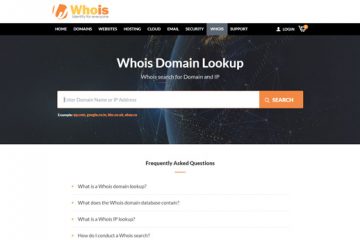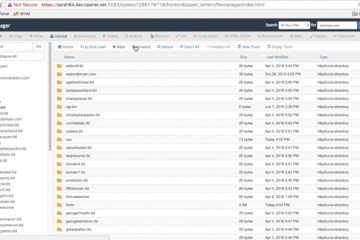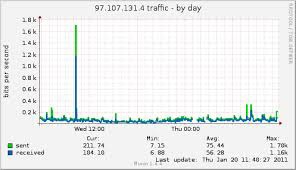In the context of web hosting, domains, also known as websites, refers to both the domain name and the hosting of the files associated with it. Plans that offer unlimited domains frequently come with unlimited bandwidth and unlimited storage as well. View hosting plans with unlimited domains from popular hosts or lowest pricing below.
Table of Contents
Note: WHdb.com is funded with the help of our visitors. We receive a small commission fee when a user signs up for hosting at no additional cost to our visitors. All information on this website, including prices, is intended to be informational only.
What Unlimited Domains Refers To
While the “unlimited” part of unlimited domains is evident, the
“domain” part can be a bit more complex than it seems at first glance. For
hosting plans with limits on domains, primary domains and add-on domains are
generally the only ones to count towards that cap. A primary domain is the website you start your hosting account with
while add-on domains are secondary
domains created afterward.
Subdomains and parked domain generally do not count towards
your domain cap. Subdomains are
secondary areas of your websites frequently used to provide additional spaces
for your visitors like forums, profiles, support channels, and so on. Parked
domains are name-only with no website or email associated with them and are
often used to redirect related domains to a main website.
Can I Really Host Unlimited Domains On One Account?
Hosting plans offering unlimited domains allow a customer to
add as many websites as they need. That said, other limitations can apply,
primarily bandwidth and email allowances. While each site exists on a different
domain, each site shares the same resources with other sites on the same server.
While plans with unlimited domains often include unlimited bandwidth, this doesn’t increase the speed that data can transfer to and from your website. This can lead to slow load times across all of your websites not just one. Regarding emails, many hosts limit the amount of emails that can be sent out from a single server through an hourly threshold. Finally, each domain still requires registration. While your hosting is a fixed price for all domains on a single account, the domain registration is separate for each website and recurs annually. While domain registration is relatively inexpensive, having to pay it for dozens or hundreds of sites adds up.
It is always important to read the terms of each unlimited domains hosting plan, since they may vary with each web host provider. Some offer unlimited domains only if you registered the domain prior to signing on with them, while others require that you register the domain through them for it to be part of the unlimited domains plan.
Advantages and Uses of Unlimited Domain Hosting
Unlimited domain hosting plans allow you to have all of your domains with one web host provider on one account, a convenient option for anyone with several ideas in mind for websites like writers or entrepreneurs. The advantages of unlimited domains include:
- Registering a domain ensures that no one else can use your domain name. You can register a domain for one or more years at a time for a relatively low annual cost. If your registered domain is not yet associated with a website, that is referred to as a parked domain.
- Many unlimited domain hosting plans also come with unlimited email accounts. Business owners and entrepreneurs can customize the email accounts to match a domain name, and distribute the email accounts to their employees.
- Since most websites only use between 100-200 MB of storage and don’t receive large quantities of web traffic (unlike Amazon, Facebook, and Google), you can get an unlimited domain hosting plan without needing unlimited bandwidth and storage too.
What Type of Hosting Best Supports Unlimited Domains?
Unlimited domain hosting is most commonly offered on Shared, VPS, and Cloud hosting plans. VPS and Cloud hosting have more resources to support an unlimited domain plan. With a Shared hosting plan, you may encounter more downtime and slower load times for each of your domains because they (and the other accounts using that same server) are overloading the server.
Can People See Network of Sites if They’re on the Same Host?
The Internet Corporation for Assigned Names and Numbers, or ICANN for short, requires that each registered domain displays its database and personal contact information on WHOIS. The organization, WHOIS, manages domain registration data and makes the information available to the public.
Many web host providers offer domain privacy or domain protection for a small additional fee. This service replaces your personal information that is posted on WHOIS with the web host providers. The example from domain.com below shows how your information is displayed on WHOIS with and without domain privacy.
Additional Resources for Unlimited Domains
These resources that we have curated can help you make an accurate and informed decision and avoid any regrets or buyer’s remorse.
- Can I Create Multiple Websites with One Domain Name? – Discover several ways that you can have several websites with just one domain.
- Should I Start My Site Under a New Domain Name or as a Subdirectory (Or Subdomain) Of My Existing Site? – Christopher Heng explains the pros and cons of starting a site with a new domain or adding it as a subdomain.
- Unlimited Domains with Shared Hosting vs. Reseller Hosting – This comprehensive article breaks down four points you should consider if you want unlimited domains, but can’t decide between Shared or Reseller hosting.
- How to Create the Perfect Domain Name – This wikihow page gives you five tips, complete with screenshots, on how to create a domain.
- Domain Name Articles – Each article on this hub page has different bits of advice on how to choose, obtain, and register your domain name.
- A Few Details on Domains (infographic) – The what, who, how, and why about domains is answered in this easy to follow, interactive infographic.
- Domain Names and Hosting – An animated video that concisely covers registering a domain name, designing and developing a website, web hosting, and how to connect your registered domain name to your web host.
- How to Register Your Own Domain Name – PC World uses Godaddy as an example, and walks you through each of the four steps it takes to register your domain name.




